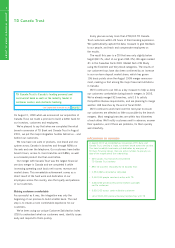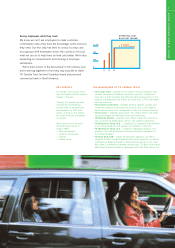TD Bank 2001 Annual Report Download - page 20
Download and view the complete annual report
Please find page 20 of the 2001 TD Bank annual report below. You can navigate through the pages in the report by either clicking on the pages listed below, or by using the keyword search tool below to find specific information within the annual report.
18
HOW WE PERFORMED IN 2001
MANAGEMENT’S DISCUSSION AND ANALYSIS OF OPERATING PERFORMANCE
Our total economic profit was $685 million in 2001, up
from $639 million in 2000. Beginning in fiscal 2000 we
have utilized economic profit as a tool to measure shareholder
value. Economic profit is our operating cash basis net income
applicable to common shareholders after providing a charge for
economic capital. For 2001 and 2000, the rates applied for
each of our businesses were 11% for TD Canada Trust, 13% for
TD Securities, 15% for TD Waterhouse and 11% for TD Wealth
Management. The economic capital for each business includes a
portion of the regulatory capital required for goodwill and net
intangible assets, so that all of our common equity is allocated
to our business segments.
NET INTEREST INCOME (TEB)
We calculate net interest income by adding the interest and
dividends we earn from loans and securities, and subtracting
the interest we pay on deposits and other liabilities.
It’s calculated on a tax equivalent basis (TEB), which means
that the value of non-taxable or tax-exempt income such as
dividends is adjusted to its equivalent before tax value. This
allows us to measure income from all securities and loans
consistently and makes for a more meaningful comparison of
net interest income with other institutions.
See supplementary information page 33, tables 3, 4 & 5
Net interest income (TEB) increased by $832 million or 22% in
2001 to $4,636 million.
Average earning assets
The increase in net interest income was partly due to an 8%
growth in average earning assets. The increase in average
earning assets primarily reflects strong growth in trading
activities at TD Securities. Average trading securities grew by
$10 billion or 16% to $70 billion. Although these assets have a
5.0
4.5
4.0
3.5
3.0
2.5
NET INTEREST INCOME (TEB)
(billions of dollars)
97 98 99 00 01
75
50
25
0
OPERATING CASH BASIS RETURN ON ECONOMIC CAPITAL
(percent)
00 01
TD Canada Trust
TD Securities
TD Waterhouse
TD Wealth
Management
How we performed
1,200
600
800
1,000
400
200
0
OPERATING CASH BASIS NET INCOME BY
MAJOR BUSINESS SEGMENTS
(billions of dollars)
99 00 01
TD Canada Trust
TD Securities
TD Waterhouse
TD Wealth
Management
NET INCOME
In its simplest terms, net income is the “bottom line” – all
of our revenues, less all of our expenses, loan losses and
income taxes.
Reported net income applicable to common shareholders was
$1,300 million in 2001, compared with $969 million in
2000 and $2,938 million in 1999. Reported earnings per
share were $2.07 in 2001 compared to $1.56 in 2000 and
$4.90 in 1999.
For purposes of reviewing and analyzing our performance,
we focus on operating cash basis results. This means we
exclude items that we don’t consider to be part of our normal
operations. Operating cash basis results are presented on this
basis in order to provide a meaningful year-over-year comparison
of our performance.
Operating cash basis results don’t include restructuring costs
related to acquisitions and significant business restructuring
initiatives (TD Securities in the fourth quarter 2001, TD
Waterhouse in the third quarter 2001, Newcrest in the first
quarter 2001 and Canada Trust in the second quarter 2000),
the effects of future tax rate reductions on future tax balances in
the first and third quarter 2001, the net effect of real estate
gains and general allowance increases in the first and second
quarter 2001 and the gain on sale of TD Waterhouse Group,
Inc. and Knight/Trimark in 1999. These results also don’t include
the after-tax impact of goodwill and other purchase-related
intangible amortization.
See supplementary information page 32, tables 1 & 2
Operating cash basis net income was $2,158 million in
2001, an increase of 7% from 2000. Operating cash basis net
income was $2,018 million in 2000, an increase of 37% from
1999. Despite challenging economic conditions, TD Bank
Financial Group had a solid performance in 2001, resulting from
contributions from TD Canada Trust and TD Securities.
Operating cash basis earnings per share were $3.31 in 2001
compared to $3.16 in 2000 and $2.39 in 1999. Operating cash
basis return on total common equity was 18% for 2001,
compared to 18% in 2000 and 17% in 1999.
























